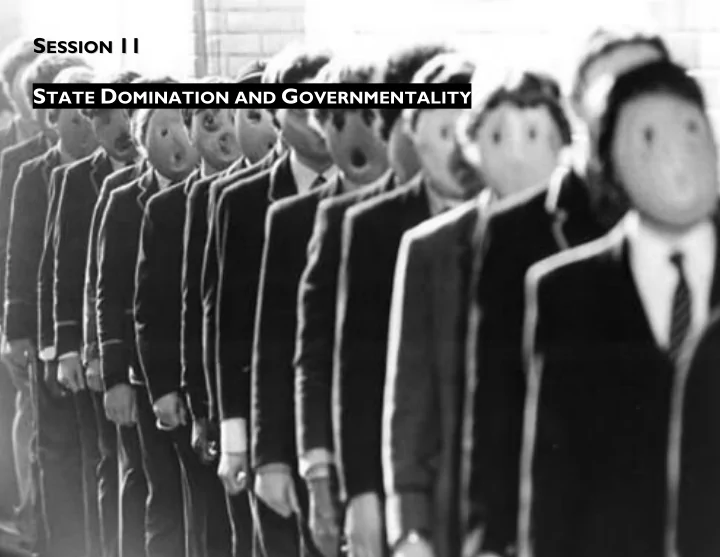

S E 11 1 S 1 ES SS SI IO ON N S TATE D OMINATION AND G OVERNMENTALITY 1
Weber, Gramsci, Althusser: What is the state & where is it? the state as a form of domination Philip Abrams: the state as an exercise in “moral regulation” Abrams: the state as an idea; legitimation of domination Abrams: prisons & military Q: What are the boundaries between states and societies? Q: How does rule really happen? Max Weber, Antonio Gramsci, and Louis Althusser How social institutions play a role in domination and governance Weber: bureaucratization, not limited to the state alone Gramsci and Althusser: people educated to consent to domination Gramsci: the state as an entire apparatus… Althusser: the media, schools, church, family, and political parties— Ideological State Apparatuses or ISAs 2
Weber: Bureaucratization Legally administered official duties and authority “Bureaucracy is fully developed in political and ecclesiastical communities only in the modern state, and in the private economy only in the most advanced institutions of capitalism” 3
Characteristics of Modern Bureaucracy: authority, official duties, regulation superiors, subordinates, supervision: office hierarchy (churches, political parties, businesses, schools) documentation, “files” training, specialization loyalty to the office: impersonal, functional orientations social esteem of the office appointment, not election tenure, salary monetization of economies, bureaucratization warfare and bureaucratization universities as bureaucracies democratization versus bureaucratization (management of masses) secrecy, the “office secret,” preference for a poorly informed or uninformed parliament 4
The “success” of state society is the permeation of the logic of the office throughout the society. 5
Gramsci: Policing and Consent “educative and formative role” morality of the masses consent and collaboration, turning coercion intro freedom Law (laws, courts, police, etc.) & school systems “In reality, the State must be conceived of as an ‘educator’” The state = the apparatus of government + the apparatus of hegemony + civil society 6
Althusser: The Reproduction of Submission (1) reproduction of labour power requires reproduction of its skills (2) also requires a reproduction of labour’s submission (3) agents of exploitation and repression reproduce their ability to manipulate the ruling ideology Schools (but also the Church, or the Army) teach “knowhow” “The reproduction of labour power thus reveals as its sine qua non not only the reproduction of its ‘skills’ but also the reproduction of its subjection to the ruling ideology or of the ‘practice’ of that ideology”. 7
Ideological State Apparatuses (ISA): – religious ISA (the system of the different Churches), – educational ISA (the system of the different public and private schools), – family ISA – legal ISA – political ISA (the political system, including the different Parties), – trade-union ISA, – communications ISA (press, radio and television, etc.), – cultural ISA (Literature, the Arts, sports, etc.). ISAs, private domain, ideology Repressive State Apparatus (RSA): public, coercion 8
Recommend
More recommend